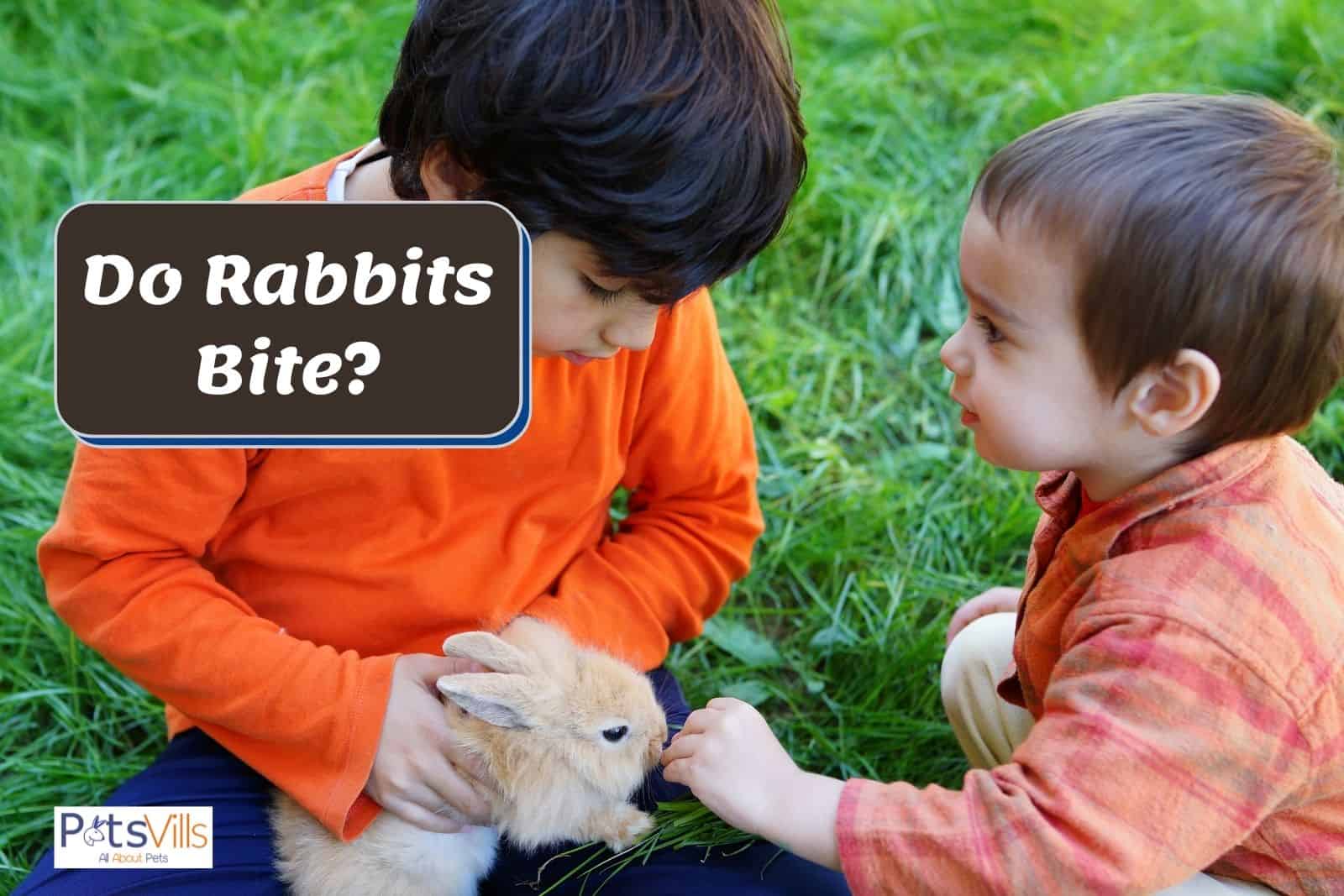Rabbits are cute, domestic animals that make great household pets. While they have adorable looks and undemanding nature, they also have prominent front teeth that may intimidate some people.
Why do rabbits bite? Rabbits will usually only bite when they are frightened, startled, hormonal, defensive, or distressed.
Here we have all you need to know about whether and when rabbits may bite and tips to train them, so they don’t!
READ MORE: Are Rabbits Nocturnal?
Table of Contents
Do Rabbits Bite?
It’s rare for a rabbit [1] to bite unless they are frightened, startled, hormonal, defensive, or distressed.
While rabbit nipping is usually not serious, biting may cause concern.
Rabbit bites [2] can be nasty, and understanding them better can help you avoid being hurt.
Rabbits are territorial animals [3] which means that they are generally possessive about their belongings. Many rabbits don’t like their food, bedding, or surroundings being touched or rearranged.
They may even get possessive about their companions!
When you need to clean your rabbit’s hutch or make changes to its bedding or food supply, creating a distraction is usually the wisest thing to do if you need to avoid the chance of being bitten.
The best way to go about it is to place their favorite treat or food away from their hutch so that you can do your chore in peace without worrying about any bunny attacks.
A rabbit may also bite you when it is frightened.
This can occur because of mishandling of the bunny, especially when you hold it loosely or handle it recklessly, and it is scared of falling off.
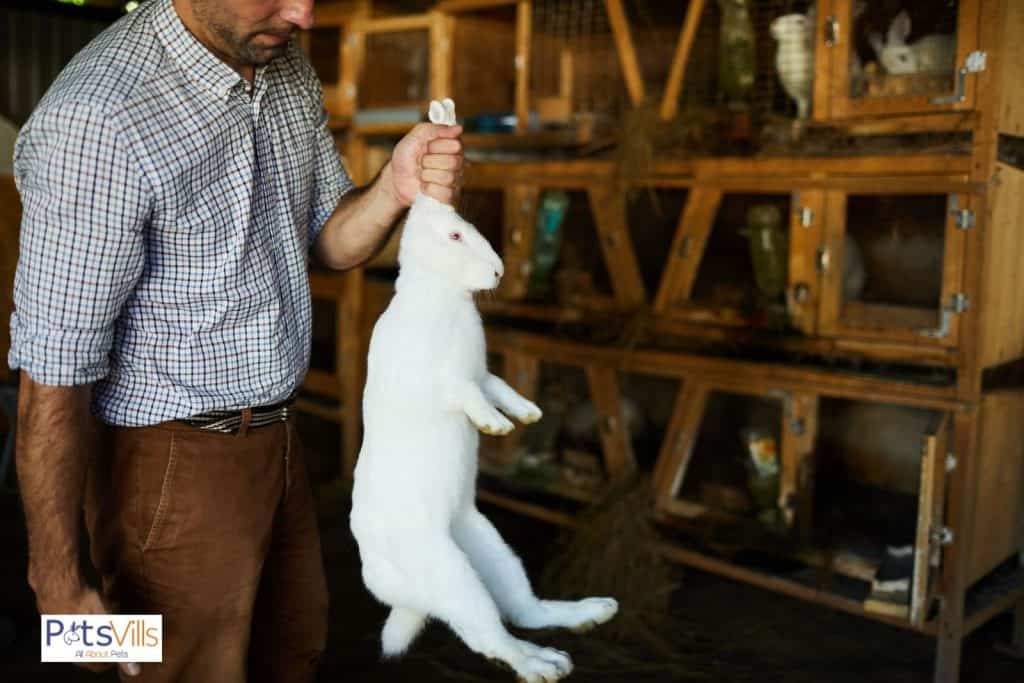
It is not recommended to let small children handle a rabbit for this very reason. They might end up getting bitten by a frightened or angry bunny!
Hormones also play an essential role in a rabbit’s mood. During mating season, your bunny’s raging hormones may cause it to act aggressively [4].
Therefore, it is recommended to take your bunny for neutering or spaying if you find it biting due to possible agitation. This will get it to cool down and stay peaceful.
Some people might think it cruel, but it’s a win-win situation for both you and your bunny.
Just make sure you go to a qualified rabbit vet for the procedure to avoid any complications that might make your bunny end up hurt.
Nipping is a common habit among rabbits, especially when they need attention. It’s nothing to worry about much, except if it gets more frequent or intense.
In some cases, bored bunnies may bite instead of the usual nipping.
Don’t forget to check our guide on why do rabbits grunt at you.
How to Train Your Rabbit to Stop Biting
Always make sure to shower your bunny with love and praise whenever it behaves and doesn’t bite.
On the occasion of biting, you can clap to let your rabbit understand that the behavior was unacceptable.
A precaution you can take to prevent your rabbit from biting you is to wash your hands to get rid of any food or scents of edibles before handling your bunny.
Otherwise, your bunny might assume your hand to be its meal because of the scent!
One thing to remember is never to try and physically discipline your pet. Bunnies, who don’t know any better, don’t deserve such treatment.
Physical violence might cause them to become even more defensive and start fearing you, with the biting habit becoming even more consistent.
The worst that can happen is you or your rabbit getting seriously hurt, or you might even end up with a dead bunny on your hands.
If you want to learn more about how to pick up your rabbit, Tamsin from therabbithouse.com has written a great article on why so many rabbits hate being picked up.
But if you need some quick guide, then please watch this video.
Steps You Should Take if Your Rabbits Bites You
When your rabbit bites you, you should make a high-pitched sound. This lets your rabbit know that they hurt you.
You often think that your rabbit is biting down hard, only to find that your skin hasn’t been broken, and it was only a nip.
Such nipping is relatively common and doesn’t require special treatment except washing your hands with soap and water.
For more problematic rabbit bites that break the skin, taking the standard first aid care steps is recommended. Clean it with a good disinfectant and bandage it properly.
In general, rabbit bites are pretty unproblematic, and the risk of infection is very low.
Technically, rabbits can be carriers of the Rabies virus, but it’s mostly a cause of concern in stray rabbits and will need emergency medical attention.
Rabbit bites of the nastier kind are usually small chunks of flesh torn off. In the rare case of a deep, penetrating wound, you might need stitches to stop the bleeding.
For any concerns, you should visit a doctor and get checked.
Keep Your Rabbits Away From Other Animals
Abandon the thought of your rabbit being friends with other animals such as dogs and cats. They could be a bad company, and either your bunny or your other pet could seriously get hurt.
Most probably, your rabbit may catch the behavior of frequently biting due to its instinct of staying defensive to show dominance among other animals.
Other household pets may not get along with your rabbit and may agitate your bunny enough for it to resort to biting.
As for getting along with other rabbits of their kind, there are greater chances of forming a bond than showing aggression.
Most people even recommend keeping two or more rabbits together to keep each other company.
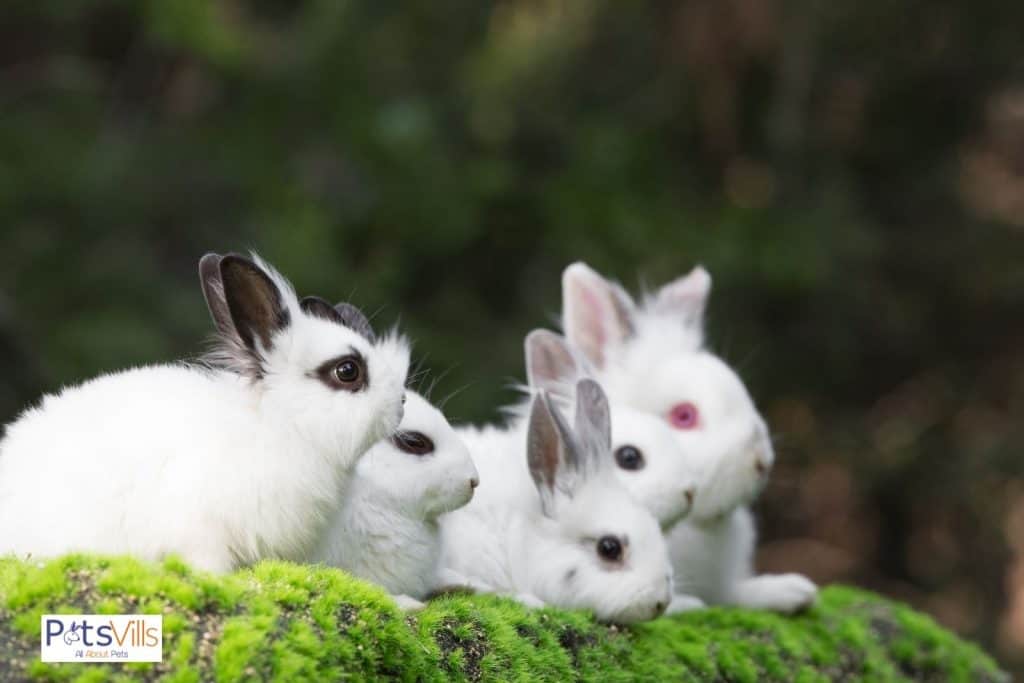
Rabbits, being gregarious creatures, are predisposed to living in harmony together. However, this doesn’t mean that they won’t fight.
Rabbits may fight each other, and biting can result if they aren’t getting along.
Gaining the Trust of Your Rabbits
Rabbits are timid creatures. They are sensitive, they are shy, and they get frightened easily.
Any reckless handling on your part could lead to biting or your rabbit scampering away from you. While rabbits have an inquisitive nature, they often shy away from the noise.
To gain the trust of your rabbit, you need to spend more time alone with it.
It’s better if you’re alone for more one-on-one interaction and avoidance of interruptions and distractions.
Talk to it, feed it treats, and make it habitual of seeing your face and hearing your voice.
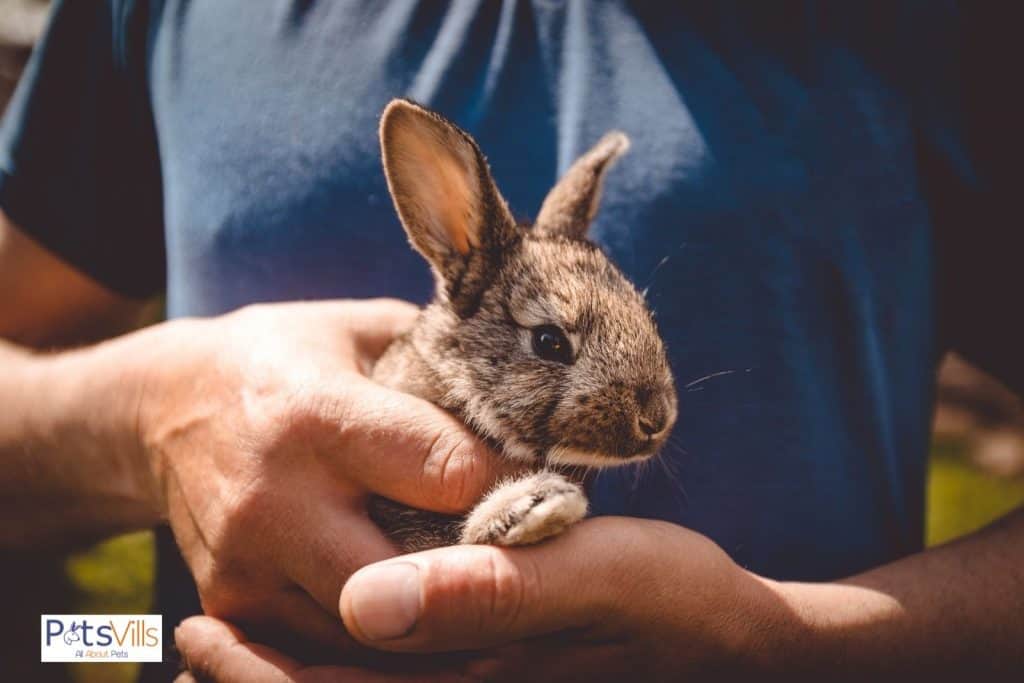
The usual noise of multiple people or other pets can often overwhelm a rabbit, so it’s better if you go someplace there are no other humans or animals.
One important thing to avoid is reaching into the hutch yourself and picking up your rabbit. Let the hutch be your bunny’s safe space, and coax it out by offering treats.
If your rabbit is not ready to come out, be patient and try again after some time. Staying calm is vital since any impatient behavior on your part may intimidate it.
Thanks to their generally curious nature, your bunny should eventually come out of its hutch.
To motivate it to do so, you can offer it treats like oats, or pieces of carrots, apples, or bananas by holding them out in the palm of your hand near the door of the hutch.
Remember to exercise caution in whatever treats you give your rabbit. Avoid giving chocolates, coffee, and excess fruits and vegetables.
Take a look at this video on how to gain the trust of your rabbit.
Once curiosity gets the better of your rabbit and it is ready to leave its hutch, you must stay calm and composed with infrequent movements. The goal here is to make your rabbit eat out of your hand.
Avoid stroking or petting your rabbit as it eats to avoid distractions. If you stay still enough, your rabbit might even hop onto you or come closer to investigate.
When you spend much one-on-one time with your bunny daily, it will soon start to recognize you as its friend and will not attack anymore.
Introduce your rabbit to your touch little by little, and never chase your rabbit because this is a cause of fear for them.
It is always wiser to allow your rabbit to take the lead when it comes to physical contact. Instead of forcing yourself on your bunny with petting and stroking, let it come closer to you first by itself.
If you’re feeling that your bunny is getting annoyed or agitated by your touch, it is better to stop and try again later.
Always handle your rabbit correctly, fully supporting the weight of its body instead of letting it hang from your hand.
Once your rabbit has warmed up to you, it can be your best friend, and you may even allow nose nuzzling and cuddles!
READ MORE: 15 Best Toys For Rabbits To Keep Them Happy
The Dos and Don’ts of Dealing with Rabbits
Relating to rabbit care, there are some general rules of thumb that you should follow to avoid any biting incidents.
Firstly, do not allow children to handle your rabbit. Some children may be reckless and inappropriate handling may agitate the rabbit and cause it to bite.
Secondly, it is always better to relocate your rabbit before cleaning out its hutch.
While the rabbit is still there, revamping and cleaning out its cage, bedding, or food bowl may cause defensive biting behavior.
Another critical thing to take care of is keeping your rabbit away from other animals.
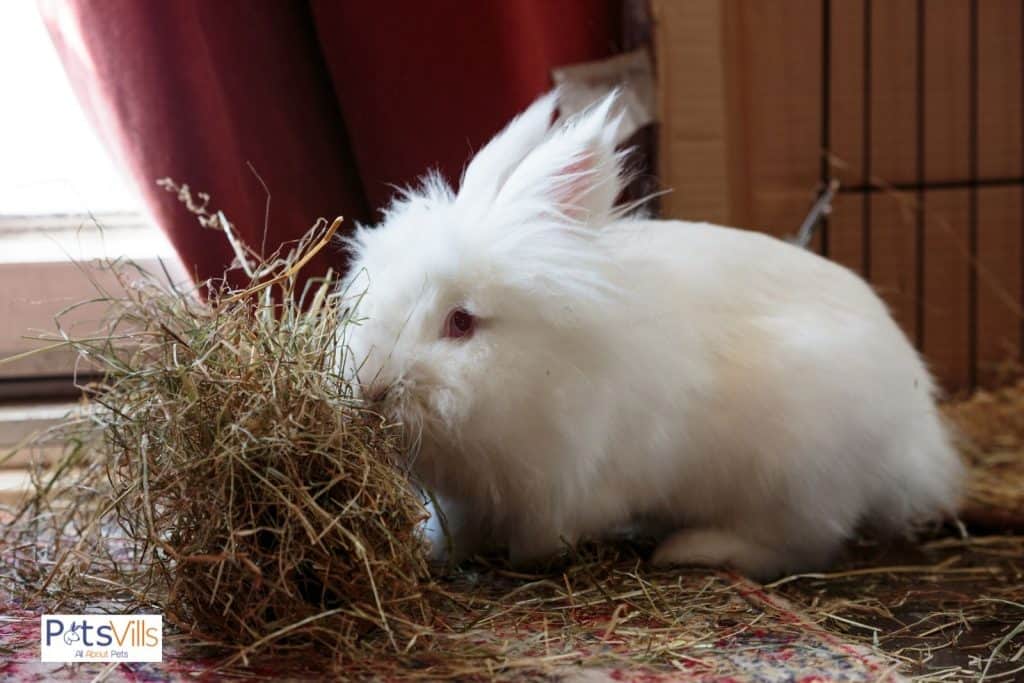
Rabbits generally aren’t very generous creatures, and they aren’t good at sharing spaces.
Their territorial instincts may kick in when animals are kept in the same space as them. Your bunny may then resort to biting, and it can turn into a bloody fight!
Never treat your rabbit when it has recently bitten you. It may take this as a go-ahead sign for such behavior in the future.
You must stay firm and show your disapproval without getting physical upon receiving a bite from your bunny.
Rabbits can recognize vocal cues, and they’ll soon get the idea that biting is not something you encourage.
Chasing your rabbit is another thing to avoid since it may become fearful of you. It is best to let out treats for your bunny in the palm of your hand and let it come to you itself.
Once you have made your progress and your bunny allows you to stroke, pet, touch, and hold it, you should still exercise care when carrying it. Never hold your bunny with half its body unsupported.
Just like other pets, your rabbit also needs exercise. It’s essential to let it out of its hutch and allow it to scamper under your supervision.
Also Check: Why Are Rabbits Good Pets?
FAQs:
Are rabbit bites dangerous?
Rabbit bites do not carry any risks of infection as long as your rabbit is domestic. The bite of a wild rabbit is a more significant cause of worry and warrants a visit to the doctor.
My rabbit bites when I touch it; what should I do?
You should avoid forcefully touching your bunny. Some rabbits don’t do well with petting and stroking, so it is better to let them get used to you first. Spend more time with your rabbit and let it ease into your touch.
What treats can I give my bunny to gain its trust?

You can form a friendship with your rabbit by giving them their favorite treats. Avoid sugary products and anything with chocolate and caffeine. You can give small pieces of bananas, apples, oats, or carrots.
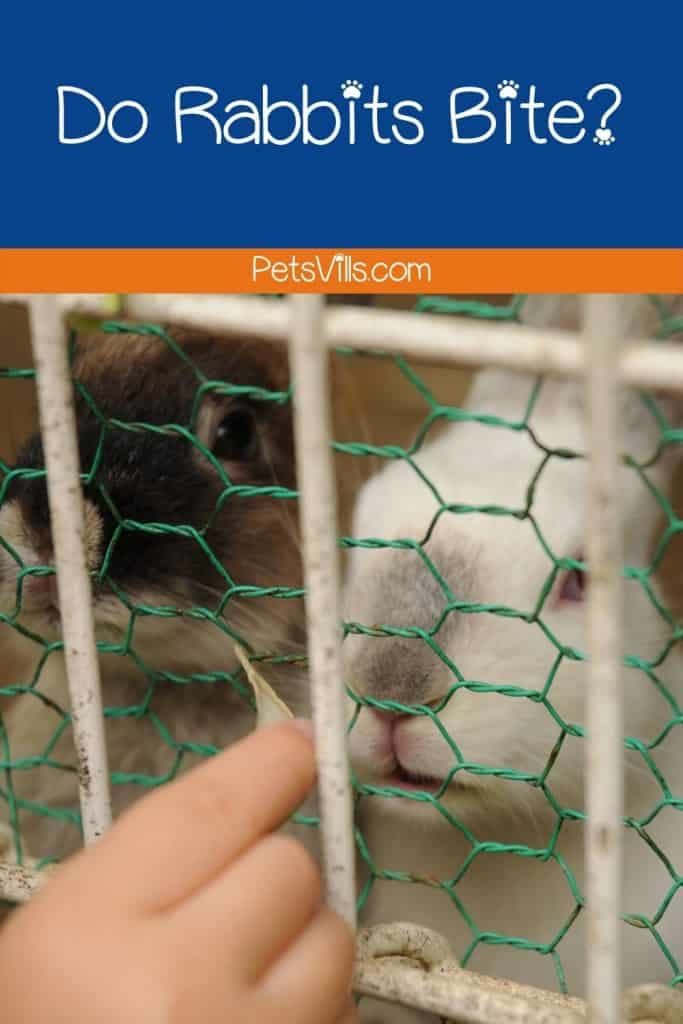
Did your rabbits ever bite you? Let us know in the comments section!
Resources
- 1. March 2017 AB-LSC 07. Rabbits: Habits, Diet & Other Facts [Internet]. livescience.com. Available from: https://www.livescience.com/28162-rabbits.html#:~:text=Rabbits%20are%20small%20mammals%20with
- 2. Varga M. Rabbit Basic Science. Textbook of Rabbit Medicine [Internet]. 2014;3–108. Available from: https://www.ncbi.nlm.nih.gov/pmc/articles/PMC7158370/
- 3. DiVincenti L, Rehrig AN. The Social Nature of European Rabbits (Oryctolagus cuniculus). Journal of the American Association for Laboratory Animal Science : JAALAS [Internet]. 2016;55:729–36. Available from: https://www.ncbi.nlm.nih.gov/pmc/articles/PMC5113872/
- 4. Gerencsér, Matics, Szabó, Kustos, Mikó, Nagy, et al. Aggressiveness, Mating Behaviour and Lifespan of Group Housed Rabbit Does. Animals. 2019;9:708.

